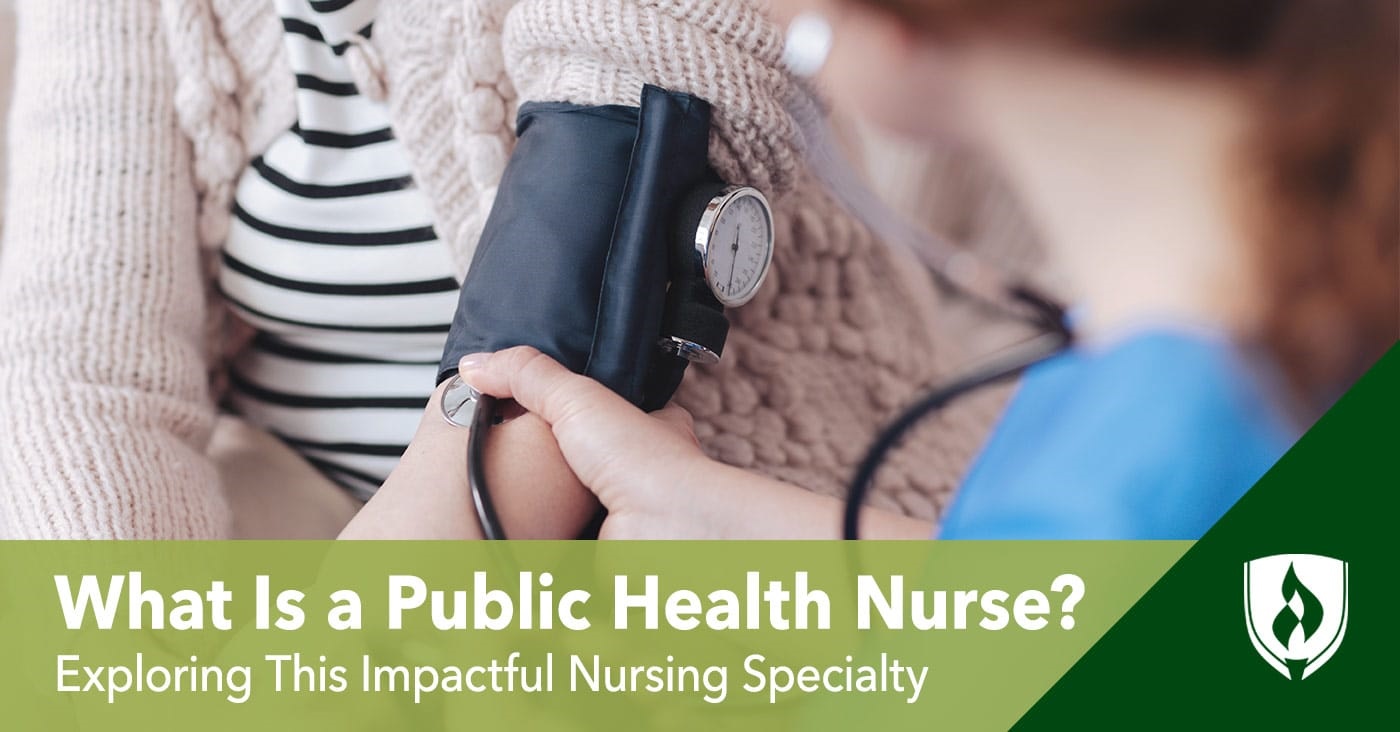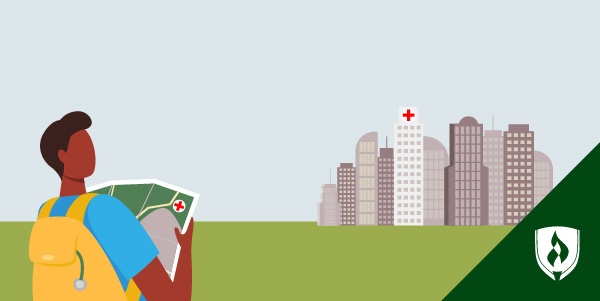What Is a Public Health Nurse? Exploring This Impactful Nursing Specialty
By Ashley Brooks on 03/01/2021

Most people have no problem picturing what a nurse does all day. But ask them about the role of a public health nurse, and you’ll probably get a blank stare. Even with the COVID-19 pandemic placing public health nurses in a global spotlight, it’s understandable if you might not know what exactly these nurses are actually responsible for.
That’s nothing to be ashamed of as not everyone needs to know the ins and outs of public health nursing. But if you have an interest in nursing, you might want to learn more about different types of nurses out there and your potential specialization options—public health nursing included.
So what is public health nursing? If the only answer you can come up with is a vague picture of someone in scrubs passing out flyers about healthy foods, then you’ve come to the right place!
We’re exploring all the answers you need to know about public health nursing, including what they do, where they work and what kind of education they need. After reading this article, you’ll have all the answers to the question “What is a public health nurse?”
What do public health nurses do?
Public health registered nurses (RNs) work at the intersection of public health and nursing. Rather than caring for individual patients, like most generalist RNs, public health nurses care for entire groups of people. They do this by focusing on entire populations, such as low-income patients, pregnant women, those in a certain geographical area or those with conditions like diabetes or high blood pressure. Often these populations are at a greater risk for health issues or complications and are in turn prioritized for assistance by public health departments.
Public health RNs approach nursing from a different perspective than RNs in other specialties. Rather than treating a single health issue when it arises, they look at many risk factors and try to prevent health problems before they begin.
“Public health nurses acknowledge the complexity of public health problems and the contextual nature of health—including cultural, environmental, historical, physical and social factors,” according to the American Public Health Association (APHA).1 These nurses take a bird’s-eye view so they can see systems that may be affecting the overall health of different groups of people. They are big-picture thinkers who aim to improve public health by educating patients and encouraging policy changes that make a safer, healthier world for everyone.
The job duties of a public health RN vary quite a bit depending on where they are employed and what their specialty is, but these are a few of the tasks they may encounter:
- Performing preventative health screenings
- Developing educational material and teaching patients about various health risks
- Communicating with communities in case of a natural disaster or infectious disease outbreak
- Evaluating the overall health and wellness needs of specific populations
- Informing population groups about relevant community resources
As you can see, the work of public health nursing professionals is largely in line with the adage, “An ounce of prevention is worth a pound of cure.” By educating, screening and prioritizing preventative measures, public health nurses can help improve health outcomes for entire communities.
Where do public health nurses work?
Most community health workers are employed by the federal, state or local government, according to the Bureau of Labor Statistics (BLS).2 This includes work environments as wide ranging as high-profile agencies like the Centers for Disease Control and Prevention to a small county’s local health department. Individual organizations, such as nonprofit foundations or private health agencies, also need public health RNs on their team.
Regardless of how large or small a public health RN’s workplace is, there will be a focus on doing their part to improve the health of specific populations—and those groups will differ depending on where a public health nurse works.
Some geographic regions have greater struggles with pollution, narcotic drug use or obesity. Certain agencies may have a focus on specific areas of healthcare or certain types of disease. These differences are all things to consider for an aspiring public health RN who wants to follow their interests.
What are common job titles for public health nurses?
With such a variety of workplace options, it’s no surprise that there are many job titles associated with public health nursing. We’ve rounded up some of the most common job titles you’ll find in this field to give you an idea of what your options are in a public health nursing career.
Public health educators provide health and wellness information to a particular population. For example, they may hold a workshop about simple steps to lower blood pressure or an “ask anything” session for new parents with questions about vaccinations. These public health nurses need to stay creative as they develop new, relevant ways to communicate health information to their communities.
Occupational health nurses address health problems related to the workplace. This includes worker safety regarding things like proper techniques for lifting heavy items or taking safety precautions around dangerous chemicals. These nurses educate workers and employers, inspect workplaces to identify hazards and develop programs that support good physical and mental health in the workplace.
Environmental health nurses are tasked with finding environmental hazards in an area that can affect the well-being of the communities nearby. This could include risks like air or water pollution, climate change and toxic substances. Environmental health RNs work with local and state governments to fix the problem and educate the public about protecting their health.
Public health researchers aim to grow the body of clinical knowledge by developing and assisting with clinical trials and other forms of research. Their work can directly improve public health initiatives—for example, by helping to develop a new treatment for an infectious disease. Public health researchers typically work for private foundations or government health agencies.
Epidemiologists learn about infectious diseases, track infection patterns and plan for ways to treat and prevent outbreaks. They typically work with government public health agencies, conducting research to influence public health policies and keep communities safe.
What level of education is needed for public health nurses?
Public health nurses have a lot of options available to them at different levels of education. The first step for all public health nurses is to become a registered nurse. This requires an aspiring RN to graduate from nursing school, complete clinical requirements and pass the NCLEX-RN exam.
RNs who hold a Bachelor’s degree are eligible for most entry-level public nursing positions. More advanced positions, such as those related to research and epidemiology, typically require a Master’s degree in nursing (MSN) or public health (MPH). Many public health nurses begin their careers with a BSN then obtain a higher degree down the road if they want to pursue a more advanced public health role.
In some states, public health nurses may need to register to be able to use the designation PHN along with RN. There are also a variety of specialty certifications public health RNs can earn. For example, there’s the Certified in Public Health (CPH) exam and the Certified Occupational Health Nurse (COHN) credential. Although these certifications aren’t always required, they show your level of commitment to and expertise in the field and can make a good impression on employers.
Public health RNs: Keeping communities healthy
What is a public health nurse? Now you know that these RNs have an important role in keeping communities and at-risk populations healthy. They’re the invisible superheroes of the healthcare field, preventing problems before they start and saving the day when emergencies arise.
Are you thinking about joining their ranks? Public health nursing is a rewarding career—and it all begins with becoming an RN. Learn how to get started with our article “How to Become a Registered Nurse: Your 4-Step Guide.”
1American Public Health Association, The Definition and Practice of Public Health Nursing, [accessed January, 2021] https://www.apha.org/-/media/files/pdf/membergroups/phn/nursingdefinition
2Bureau of Labor Statistics, U.S. Department of Labor, Occupational Outlook Handbook, [February, 2021] www.bls.gov/ooh/. Information represents national, averaged data for the occupations listed and includes workers at all levels of education and experience. This data does not represent starting salaries. Employment conditions in your area may vary.
Related Articles:


.png)

